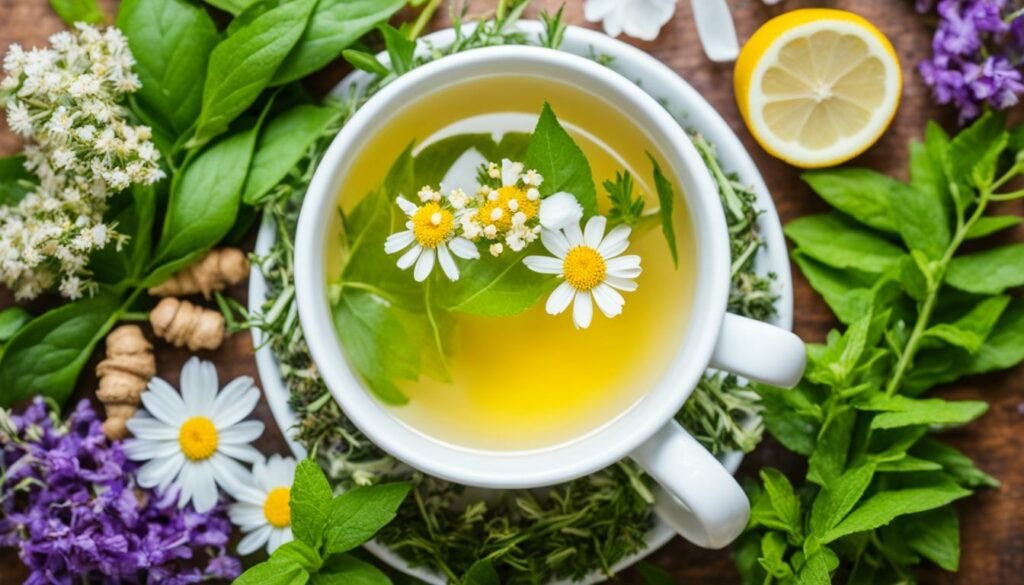The day I discovered I was pregnant brought a mix of emotions. Excitement was high, but so were questions. One of my initial concerns was, “Can I still enjoy my morning coffee?” As a coffee enthusiast, I sought answers on safe coffee consumption during pregnancy.
My quest led me to investigate organic coffee beans tailored for pregnant women and delve into prenatal nutrition. I found that while my usual three cups a day were out, I didn’t have to forgo coffee altogether. It was crucial to strike the right balance.
This guide aims to share my discoveries on safely enjoying coffee while pregnant. We’ll examine the latest guidelines, potential risks, and alternatives for those caffeine-free days. So, pour yourself a cup (perhaps decaf) and let’s begin!
Understanding Caffeine Consumption During Pregnancy
Navigating caffeine intake during pregnancy can be tricky. Pregnant women need to be mindful of their coffee consumption. Let’s explore the guidelines, risks, and potential benefits of caffeine during this special time.
Current Guidelines and Recommendations
The American College of Obstetricians and Gynecologists suggests limiting caffeine intake during pregnancy to less than 200 mg daily. This equals about one 12-ounce cup of coffee. It’s crucial to track your caffeine consumption from all sources, including tea, chocolate, and soft drinks.
Potential Risks of Excessive Caffeine Intake
Too much caffeine can pose risks to your baby. High caffeine intake has been linked to miscarriage, low birth weight, and slow fetal growth. Caffeine crosses the placenta, and your baby’s body takes longer to process it than yours.
Benefits of Moderate Caffeine Consumption
Surprisingly, moderate caffeine intake may have some benefits. Some studies suggest it might lower the risk of gestational diabetes, especially in the second trimester. It can also help with morning sickness remedies, providing a bit of relief for expectant moms.
| Caffeine Amount | Effects |
|---|---|
| Less than 200 mg daily | Generally safe, may help with morning sickness |
| 200-300 mg daily | Increased risk of complications, consult doctor |
| More than 300 mg daily | Higher risk of miscarriage and low birth weight |
Remember, every pregnancy is unique. It’s best to discuss your caffeine intake with your healthcare provider to ensure a healthy pregnancy for you and your baby.
Organic coffee beans for Pregnant Women: What You Need to Know

As an expectant mom, I’ve been delving into safe coffee options that meet my prenatal nutrition goals. Organic coffee beans stand out as a safer choice during pregnancy. They are cultivated without harmful pesticides or chemicals, ensuring a cleaner choice for both the mother and the baby.
It’s essential to consider the caffeine content when choosing coffee. This content varies significantly across different beans, roasts, and brewing methods. For example, espresso contains more caffeine per ounce but is often consumed in smaller amounts. Some popular coffee drinks can exceed the recommended daily caffeine intake for pregnant women in a single serving.
| Coffee Type | Caffeine Content (8 oz) | Safe for Pregnancy? |
|---|---|---|
| Light Roast Organic | 100-150 mg | Yes, in moderation |
| Dark Roast Organic | 80-120 mg | Yes, in moderation |
| Organic Decaf | 2-5 mg | Yes, safest option |
Organic decaf has emerged as the safest choice for my pregnancy. It lets me savor coffee without the concern of excessive caffeine. Remember, moderation is crucial when consuming coffee during pregnancy, even with organic choices.
Decaf Coffee Options for Expectant Mothers
As an expectant mom, I understand the importance of safe coffee consumption during pregnancy. Decaffeinated coffee is a viable alternative, but it’s vital to know what you’re drinking. Let’s delve into decaf options and their safety for pregnant women.
Understanding Decaffeination Methods
Decaffeination processes differ, with some methods employing chemical solvents like methylene chloride. I opt for organic coffee beans decaffeinated through natural processes, such as the Swiss Water Process. This method uses water to extract caffeine, resulting in a cleaner product.
Safest Decaf Coffee Brands for Pregnancy
When selecting decaffeinated coffee, I focus on brands that emphasize safety and quality. The Clean Label Project evaluated 23 top-selling decaf products, identifying 15 with undetectable methylene chloride levels. Here are some secure choices:
- Allegro Coffee Decaffeinated Organic French Roast
- Caribou Coffee Decaffeinated Caribou Blend
- Starbucks Decaffeinated House Blend
Potential Concerns with Decaf Coffee
Although decaf is considered safer, it’s not completely caffeine-free. Most decaf coffees retain trace amounts of caffeine. It’s crucial to monitor your intake and consult with your healthcare provider about safe consumption limits during pregnancy.
| Coffee Type | Caffeine Content (8 oz) | Safe for Pregnancy? |
|---|---|---|
| Regular Coffee | 95-200 mg | Limited consumption |
| Decaf Coffee | 2-12 mg | Generally safe |
| Organic Decaf | 2-12 mg | Safest option |
Alternatives to Coffee During Pregnancy
I’ve discovered some excellent caffeine-free beverages that can boost your energy naturally during pregnancy. These herbal tea alternatives not only taste fantastic but also support your prenatal nutrition.

Peppermint and ginger teas stand out as my favorites. They’re not just delicious but also help alleviate pregnancy-related issues like nausea and heartburn. For those craving the taste of coffee, chicory coffee is a great choice. It’s caffeine-free and closely resembles your favorite brew.
Smoothies are another fantastic option, packed with nutrients and customizable to your tastes. Another comforting choice is hot cocoa made with raw cacao powder. It offers a rich flavor without the caffeine jitters.
Here’s a quick comparison of some popular caffeine-free beverages:
| Beverage | Benefits | Taste Profile |
|---|---|---|
| Peppermint Tea | Aids digestion, reduces nausea | Cool, refreshing |
| Ginger Tea | Relieves morning sickness | Spicy, warming |
| Chicory Coffee | Coffee-like taste, prebiotic properties | Nutty, roasted |
| Fruit Smoothies | Packed with vitamins and minerals | Sweet, fruity |
| Raw Cacao Hot Chocolate | Rich in antioxidants | Chocolatey, indulgent |
It’s essential to consult with your healthcare provider before introducing new drinks to your pregnancy diet. Some herbal teas, like red raspberry leaf, may require caution during pregnancy.
How to Gradually Reduce Caffeine Intake
Reducing caffeine during pregnancy can be tough. A gradual approach is best for caffeine reduction and safe coffee consumption. Let’s look at strategies to ease your transition.
Creating a Caffeine Reduction Plan
Begin by tracking your current caffeine intake. Next, set weekly goals to decrease it. Consider mixing decaf with regular coffee, using less coffee grounds, or brewing for shorter times. Aim for a balance that meets your prenatal nutrition needs.
Managing Withdrawal Symptoms
Decreasing caffeine might lead to headaches or fatigue. These symptoms are normal. Stay hydrated and rest well. If symptoms worsen, consult your doctor about safe alternatives. Prioritize your health and your baby’s during this period.
Finding Natural Energy Boosters
Switching to natural energy sources is crucial. Here are some alternatives:
- Eat balanced, nutrient-dense meals
- Stay hydrated with water or herbal teas
- Get regular, gentle exercise
- Ensure you’re getting enough sleep
| Natural Energy Booster | Benefits |
|---|---|
| Chia seeds | High in omega-3s and fiber |
| Bananas | Rich in potassium and natural sugars |
| Almonds | Packed with protein and healthy fats |
| Green leafy vegetables | Full of iron and vitamins |
By adopting these strategies, you can reduce caffeine intake gradually. This will help you maintain your energy levels and focus on safe coffee consumption during pregnancy.
Monitoring Your Coffee Consumption: Tips and Tricks
During pregnancy, it’s vital to monitor your coffee intake for safe consumption. Being aware of all caffeine sources is essential for proper prenatal nutrition. This includes not just coffee but also tea, soda, chocolate, and certain medications.
To effectively track my caffeine intake, I rely on a simple app on my phone. This tool helps me adhere to recommended limits and prevents overconsumption. Now, I’m meticulous about reading labels.
Understanding the timing of caffeine intake is crucial. I’ve discovered that avoiding coffee in the afternoon and evening aids in better sleep, which is crucial during pregnancy. Reheating coffee can impact its taste and safety, so I always prefer fresh brews.
Daily Caffeine Tracker
| Time | Beverage | Caffeine Amount (mg) |
|---|---|---|
| 8:00 AM | Coffee (8 oz) | 95 |
| 11:00 AM | Green Tea (8 oz) | 28 |
| 2:00 PM | Dark Chocolate (1 oz) | 12 |
| Total | 135 |
This tracker allows me to monitor my daily caffeine intake easily. It’s a straightforward yet effective method to ensure I’m consuming coffee safely during pregnancy.
Conclusion
I’ve delved into the realm of safe coffee consumption for pregnant women, highlighting the importance of organic coffee beans. It’s evident that moderation is paramount when dealing with caffeine. Adhering to the 200 mg daily limit ensures a healthy pregnancy while still allowing for the enjoyment of your preferred coffee.
For those aiming to reduce caffeine intake, decaf and herbal teas present viable alternatives. These choices support prenatal nutrition without sacrificing taste or the cherished coffee ritual. It’s crucial to remember that each pregnancy is distinct, making it wise to consult with your healthcare provider about the most suitable options for you and your baby.
Being cautious with your coffee intake during pregnancy doesn’t necessitate forgoing your morning cup. By opting for organic beans, considering decaf, or exploring caffeine-free alternatives, you can continue to savor your daily ritual. This approach prioritizes your health and your baby’s wellbeing. Let’s embrace informed choices that promote the well-being of both you and your little one.
FAQ
What is the recommended caffeine limit for pregnant women?
The American College of Obstetricians and Gynecologists (ACOG) advises pregnant women to limit caffeine intake to less than 200 milligrams daily.
Why is organic coffee a safer option for pregnant women?
Organic coffee is a safer choice because it’s produced without pesticides and chemicals. This makes it a healthier alternative compared to conventional coffee.
Is decaf coffee safe for pregnant women?
Decaf coffee is a viable option, but it’s crucial to note that it still contains trace amounts of caffeine. Some decaffeination methods involve chemical solvents. Therefore, it’s wise to opt for brands that employ safer techniques.
What are some recommended decaf coffee brands for pregnancy?
For pregnant women, consider these decaf coffee brands: Allegro Coffee Decaffeinated Organic French Roast, Caribou Coffee Decaffeinated Caribou Blend, and Starbucks Decaffeinated House Blend.
What are some alternatives to coffee during pregnancy?
Pregnant women can opt for herbal teas like peppermint and ginger, decaf coffee, matcha tea, chicory coffee, smoothies, and hot cocoa made with raw cacao powder.
How can I gradually reduce caffeine intake during pregnancy?
To cut down on caffeine, start by mixing decaf with regular coffee, use smaller amounts of ground coffee, or brew for shorter times. It’s also vital to seek alternative energy sources. This includes getting enough sleep, eating a balanced diet, and engaging in gentle exercise.
How can I monitor my caffeine intake during pregnancy?
To monitor caffeine intake, always read labels and keep a record of your daily consumption from all sources, including coffee, tea, soft drinks, chocolate, and medications. Utilizing apps or tools to track caffeine can be quite beneficial.












